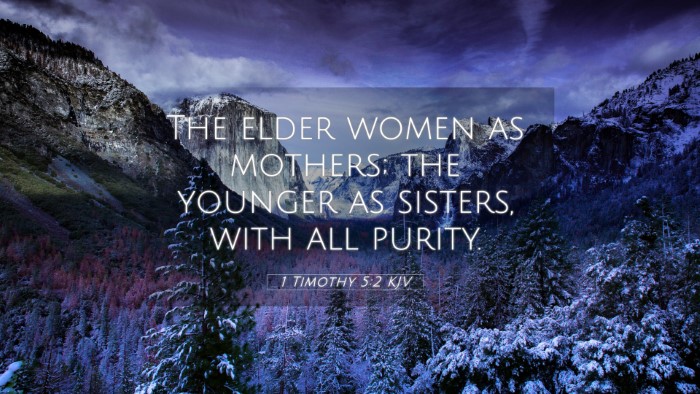Understanding 1 Timothy 5:2
1 Timothy 5:2 states: "The elder women as mothers; the younger as sisters, with all purity." This verse carries significant implications for Christian conduct and relationships within the church community.
Overview of the Verse
In this passage, the Apostle Paul gives Timothy guidance on how to interact with various members of the church, particularly women. The essence of the verse speaks to treating older women with respect akin to that given to mothers, and younger women with the purity and care one would show a sister.
Summary of Commentaries
-
Matthew Henry:
Henry emphasizes the importance of respect in church relationships. The instruction to treat elder women as mothers suggests an attitude of honor and paternal affection. Younger women are to be regarded as sisters, which indicates a relationship grounded in moral purity and mutual support.
-
Albert Barnes:
Barnes points out that this directive promotes a family-like atmosphere within the church. By addressing older women with maternal dignity and younger women with the purity associated with sibling relationships, Paul establishes a moral framework that encourages wholesome interactions among members.
-
Adam Clarke:
Clarke discusses the implications of “with all purity,” reinforcing that Timothy should exercise caution and integrity in his relationships. This guidance serves not only to protect Timothy's witness but also to foster a communal environment rooted in holiness and respect.
Key Themes and Messages
This verse invokes several critical themes for Christian living:
- Respect for Elders: Treating elder women with the dignity afforded to mothers illustrates a vital biblical principle—honoring those who are older and more experienced.
- Purity in Relationships: The emphasis on purity when engaging with younger women points to the importance of moral integrity in all church relationships.
- Communal Support: Encouraging familial relationships reflects the church as a nurturing community, where members support one another like family.
Cross-References
This verse links with numerous other biblical texts that reinforce its message:
- 1 Peter 3:7 - "Husbands, in the same way, be considerate as you live with your wives and treat them with respect..."
- Titus 2:3-5 - Instructions for older women to teach younger women, emphasizing the importance of mentorship and purity.
- Romans 12:10 - "Be devoted to one another in love. Honor one another above yourselves."
- Galatians 6:1 - Instructions on restoring a brother or sister gently, which also emphasizes care in relationships.
- Philippians 4:5 - "Let your gentleness be evident to all. The Lord is near."
- 1 Timothy 5:1 - Paul cautions Timothy to treat older men as fathers, indicating a consistent pattern of respect.
- Ephesians 5:25 - The call for husbands to love their wives as Christ loved the church mirrors the familial affection mentioned in 1 Timothy 5:2.
Thematic Connections
The themes demonstrated in 1 Timothy 5:2 encourage various methods of cross-referencing biblical texts:
- Understanding familial roles can help interpret other Pauline writings, particularly in how Christians ought to treat one another.
- Cross-segmenting Paul's counsel with the teachings found in Peter's epistles can reveal a consistent biblical theme of respect and care in relationships.
- Connections between the New Testament epistles and teachings in the Old Testament regarding community conduct can also elucidate deeper meanings.
Conclusion
1 Timothy 5:2 serves as a guide for fostering respectful, pure, and supportive relationships within the Christian community. By adopting the familial framework established in this verse, believers can create an atmosphere enriched by love, honor, and care, which aligns with biblical teachings throughout both the Old and New Testaments.
Utilizing tools for Bible cross-referencing, such as Bible concordances and Bible cross-reference guides, enhances understanding and allows for comprehensive studies around these themes. Engaging in cross-referencing Bible study methods can offer deeper insights into the interconnectedness of scripture.









